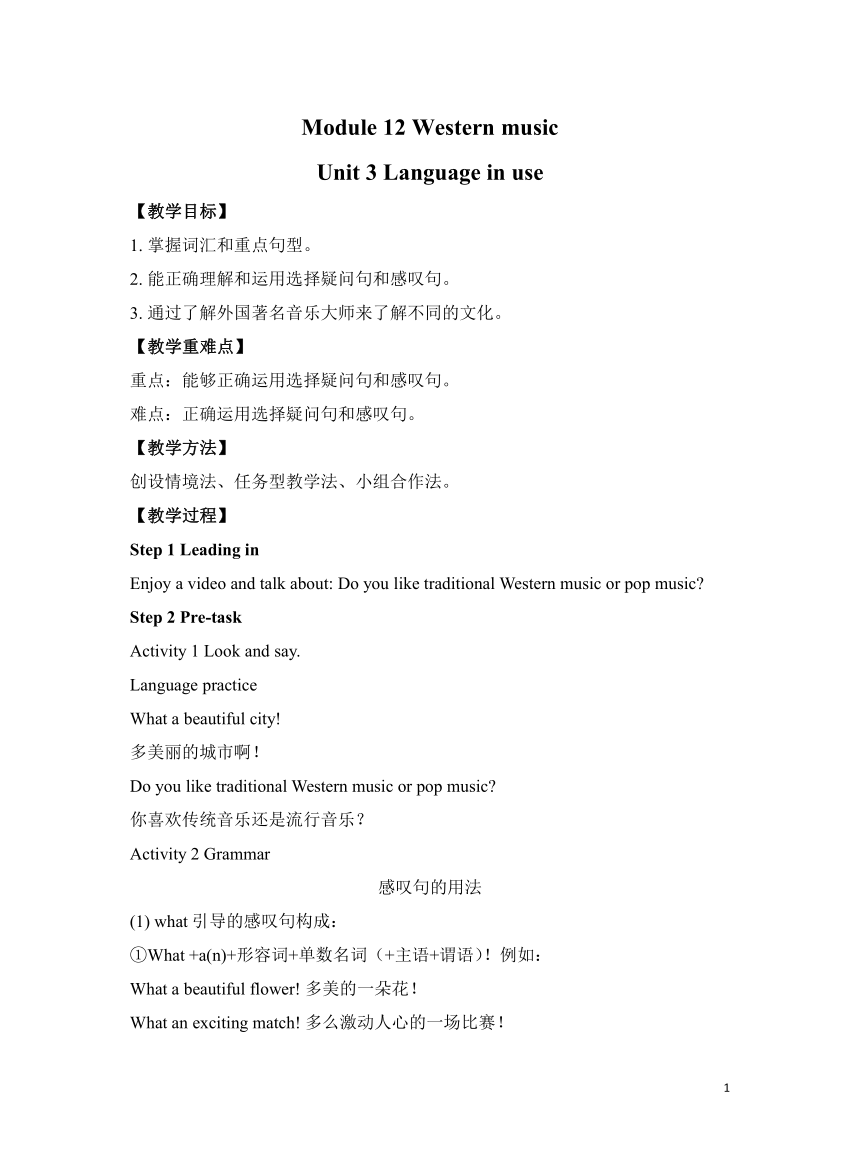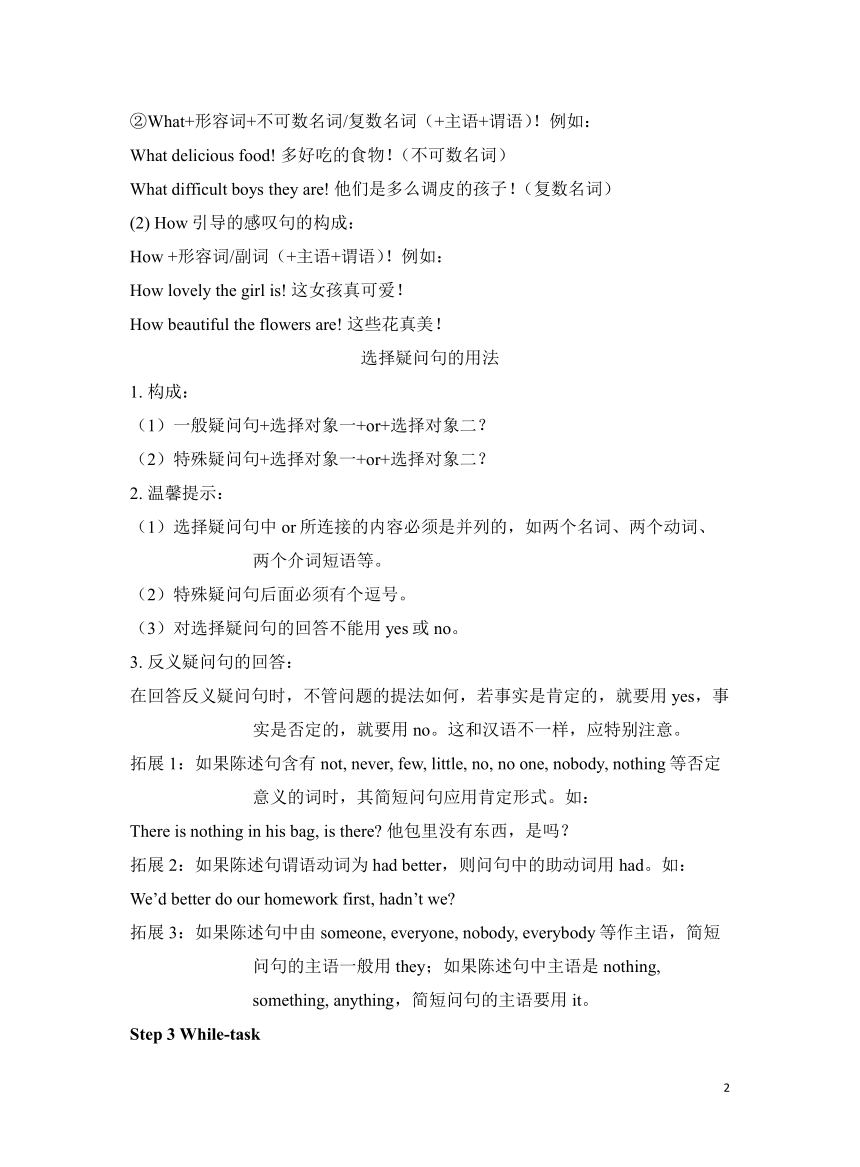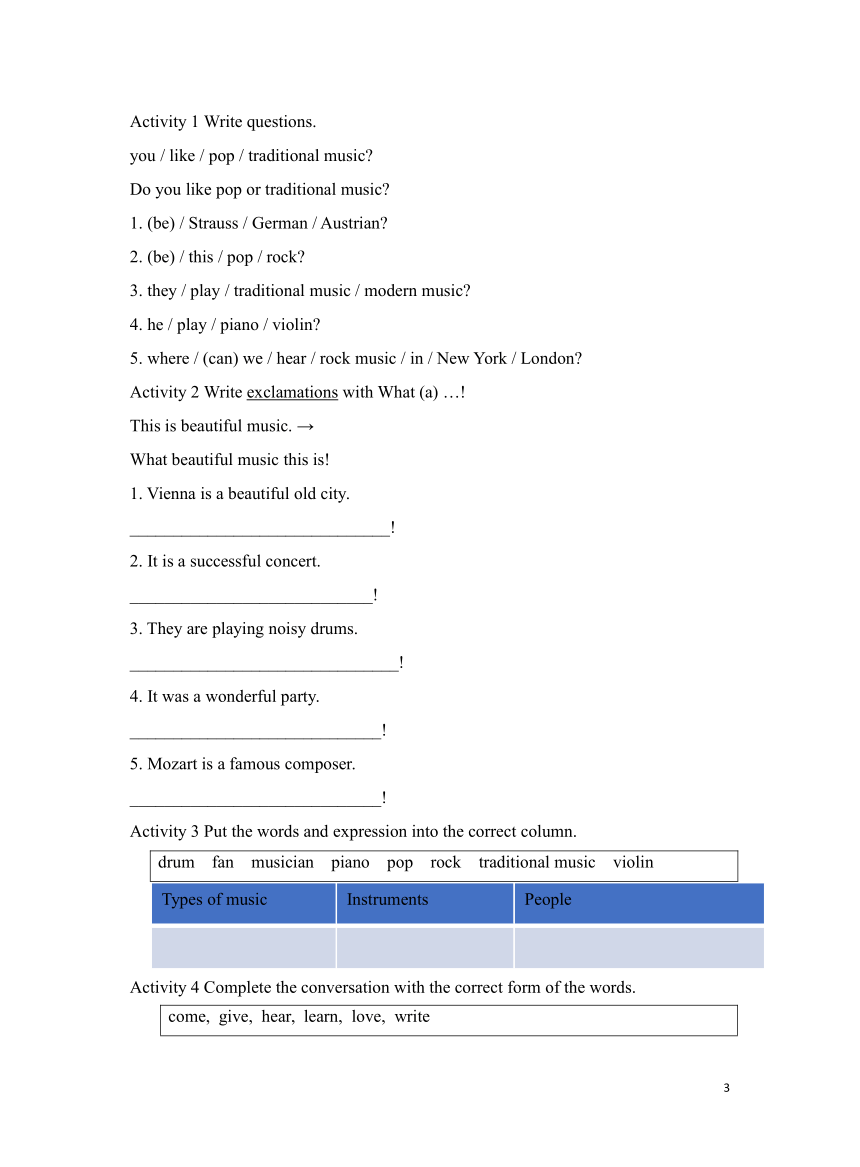初中英语外研版七下Module 12 Western music Unit3教案
文档属性
| 名称 | 初中英语外研版七下Module 12 Western music Unit3教案 |

|
|
| 格式 | doc | ||
| 文件大小 | 248.0KB | ||
| 资源类型 | 教案 | ||
| 版本资源 | 外研版 | ||
| 科目 | 英语 | ||
| 更新时间 | 2023-08-30 18:08:18 | ||
图片预览



文档简介
Module 12 Western music
Unit 3 Language in use
【教学目标】
1. 掌握词汇和重点句型。
2. 能正确理解和运用选择疑问句和感叹句。
3. 通过了解外国著名音乐大师来了解不同的文化。
【教学重难点】
重点:能够正确运用选择疑问句和感叹句。
难点:正确运用选择疑问句和感叹句。
【教学方法】
创设情境法、任务型教学法、小组合作法。
【教学过程】
Step 1 Leading in
Enjoy a video and talk about: Do you like traditional Western music or pop music
Step 2 Pre-task
Activity 1 Look and say.
Language practice
What a beautiful city!
多美丽的城市啊!
Do you like traditional Western music or pop music
你喜欢传统音乐还是流行音乐?
Activity 2 Grammar
感叹句的用法
(1) what引导的感叹句构成:
①What +a(n)+形容词+单数名词(+主语+谓语)!例如:
What a beautiful flower! 多美的一朵花!
What an exciting match! 多么激动人心的一场比赛!
②What+形容词+不可数名词/复数名词(+主语+谓语)!例如:
What delicious food! 多好吃的食物!(不可数名词)
What difficult boys they are! 他们是多么调皮的孩子!(复数名词)
(2) How引导的感叹句的构成:
How +形容词/副词(+主语+谓语)!例如:
How lovely the girl is! 这女孩真可爱!
How beautiful the flowers are! 这些花真美!
选择疑问句的用法
1. 构成:
(1)一般疑问句+选择对象一+or+选择对象二?
(2)特殊疑问句+选择对象一+or+选择对象二?
2. 温馨提示:
(1)选择疑问句中or所连接的内容必须是并列的,如两个名词、两个动词、两个介词短语等。
(2)特殊疑问句后面必须有个逗号。
(3)对选择疑问句的回答不能用yes或no。
3. 反义疑问句的回答:
在回答反义疑问句时,不管问题的提法如何,若事实是肯定的,就要用yes,事实是否定的,就要用no。这和汉语不一样,应特别注意。
拓展1:如果陈述句含有 not, never, few, little, no, no one, nobody, nothing等否定意义的词时,其简短问句应用肯定形式。如:
There is nothing in his bag, is there 他包里没有东西,是吗?
拓展2:如果陈述句谓语动词为 had better,则问句中的助动词用had。如:
We’d better do our homework first, hadn’t we
拓展3:如果陈述句中由someone, everyone, nobody, everybody等作主语,简短问句的主语一般用they;如果陈述句中主语是 nothing, something, anything,简短问句的主语要用it。
Step 3 While-task
Activity 1 Write questions.
you / like / pop / traditional music
Do you like pop or traditional music
1. (be) / Strauss / German / Austrian
2. (be) / this / pop / rock
3. they / play / traditional music / modern music
4. he / play / piano / violin
5. where / (can) we / hear / rock music / in / New York / London
Activity 2 Write exclamations with What (a) …!
This is beautiful music. →
What beautiful music this is!
1. Vienna is a beautiful old city.
______________________________!
2. It is a successful concert.
____________________________!
3. They are playing noisy drums.
_______________________________!
4. It was a wonderful party.
_____________________________!
5. Mozart is a famous composer.
_____________________________!
Activity 3 Put the words and expression into the correct column.
drum fan musician piano pop rock traditional music violin
Types of music Instruments People
Activity 4 Complete the conversation with the correct form of the words.
come, give, hear, learn, love, write
Lingling: This is beautiful music. Who wrote it, Betty
Betty: Beethoven wrote it. He was a great musician. I (1) ______ his music.
Lingling: Me too. Did he live at the same time as Mozart
Betty: Yes, he was born in 1770 and began to (2) ______ music at an early age. He (3) ______ his first piano concert when he was only seven.
Lingling: When did he start to (4) _____ music
Betty: Very early. His first work (5) ______ out before the age of thirteen.
Lingling: Was Beethoven famous at that time
Betty: Yes. But he began to lose his hearing. In the last ten years of Beethoven’s life, he (6) ______ nothing.
Lingling: That’s sad!
Betty: Yes, but he still played the piano. He died when he was fifty-six.
Step 4 Post-task
Activity 1 Around the world
Read the passage, tick true (T) or false (F).
1. Vienna New Year’s Concert takes place on 1st January.
2. It always includes pieces of music by Mozart.
3. People all over the world enjoy the music.
Activity 2 Work in pairs. Talk about one or two types of Chinese music.
beautiful fast lively modern sad slow
Now talk about Chinese music in front of the class.
Activity 3 Exercises.
一、根据汉语提示写出单词。
1. They are having a _______ (现代的) life.
2. He is the most famous ________ (作曲家) in the world.
3. She was very ___ (悲伤的) when she heard the news.
4. People often play the ______ (鼓) at Spring Festival.
5. Germany is a _________ (欧洲的) country.
二、句型转换。
1. She is a good girl. (改为感叹句)
____ ___ ____ girl she is!
2. They had a good time yesterday. (完成反义疑问句)
They had a good time yesterday, ______ ______
3. Both Lucy and Lily like pop music. (改为同义句)
___ ____ Lucy ___ ____ Lily likes pop music.
4. He likes playing football. (用play basketball改为选择疑问句)
____ ___ like playing football ___ playing basketball
5. Don’t forget to bring your homework tomorrow. (改为反义疑问句)
Don’t forget to bring your homework tomorrow, ___ ___
Step 5 Summary
1. 我们掌握了有关音乐的词汇和重点句型。
2. 学习了感叹句、反义疑问句和选择疑问句的具体运用。
Step 6 Homework
1. 用感叹句表扬你的同学。
2. 完成本模块练习册所有的作业。
【板书设计】
Unit 3 Language in use
感叹句的用法
(1) What引导的感叹句构成:
① What +a(n)+形容词+单数名词(+主语+谓语)!
② What+形容词+不可数名词/复数名词(+主语+谓语)!
(2) How引导的感叹句的构成:
How +形容词/副词(+主语+谓语)!
选择疑问句的用法
1. 构成:
(1) 一般疑问句+选择对象一+or+选择对象二?
(2) 特殊疑问句+选择对象一+or+选择对象二?
2. 温馨提示:
(1) 选择疑问句中or所连接的内容必须是并列的,如两个名词、两个动词、两个介词短语等。
(2) 特殊疑问句后面必须有个逗号。
(3) 对选择疑问句的回答不能用yes或no。
3. 反义疑问句的回答:
在回答反义疑问句时,不管问题的提法如何,若事实是肯定的,就要用yes,事实是否定的,就要用no。这和汉语不一样,应特别注意。
1
Unit 3 Language in use
【教学目标】
1. 掌握词汇和重点句型。
2. 能正确理解和运用选择疑问句和感叹句。
3. 通过了解外国著名音乐大师来了解不同的文化。
【教学重难点】
重点:能够正确运用选择疑问句和感叹句。
难点:正确运用选择疑问句和感叹句。
【教学方法】
创设情境法、任务型教学法、小组合作法。
【教学过程】
Step 1 Leading in
Enjoy a video and talk about: Do you like traditional Western music or pop music
Step 2 Pre-task
Activity 1 Look and say.
Language practice
What a beautiful city!
多美丽的城市啊!
Do you like traditional Western music or pop music
你喜欢传统音乐还是流行音乐?
Activity 2 Grammar
感叹句的用法
(1) what引导的感叹句构成:
①What +a(n)+形容词+单数名词(+主语+谓语)!例如:
What a beautiful flower! 多美的一朵花!
What an exciting match! 多么激动人心的一场比赛!
②What+形容词+不可数名词/复数名词(+主语+谓语)!例如:
What delicious food! 多好吃的食物!(不可数名词)
What difficult boys they are! 他们是多么调皮的孩子!(复数名词)
(2) How引导的感叹句的构成:
How +形容词/副词(+主语+谓语)!例如:
How lovely the girl is! 这女孩真可爱!
How beautiful the flowers are! 这些花真美!
选择疑问句的用法
1. 构成:
(1)一般疑问句+选择对象一+or+选择对象二?
(2)特殊疑问句+选择对象一+or+选择对象二?
2. 温馨提示:
(1)选择疑问句中or所连接的内容必须是并列的,如两个名词、两个动词、两个介词短语等。
(2)特殊疑问句后面必须有个逗号。
(3)对选择疑问句的回答不能用yes或no。
3. 反义疑问句的回答:
在回答反义疑问句时,不管问题的提法如何,若事实是肯定的,就要用yes,事实是否定的,就要用no。这和汉语不一样,应特别注意。
拓展1:如果陈述句含有 not, never, few, little, no, no one, nobody, nothing等否定意义的词时,其简短问句应用肯定形式。如:
There is nothing in his bag, is there 他包里没有东西,是吗?
拓展2:如果陈述句谓语动词为 had better,则问句中的助动词用had。如:
We’d better do our homework first, hadn’t we
拓展3:如果陈述句中由someone, everyone, nobody, everybody等作主语,简短问句的主语一般用they;如果陈述句中主语是 nothing, something, anything,简短问句的主语要用it。
Step 3 While-task
Activity 1 Write questions.
you / like / pop / traditional music
Do you like pop or traditional music
1. (be) / Strauss / German / Austrian
2. (be) / this / pop / rock
3. they / play / traditional music / modern music
4. he / play / piano / violin
5. where / (can) we / hear / rock music / in / New York / London
Activity 2 Write exclamations with What (a) …!
This is beautiful music. →
What beautiful music this is!
1. Vienna is a beautiful old city.
______________________________!
2. It is a successful concert.
____________________________!
3. They are playing noisy drums.
_______________________________!
4. It was a wonderful party.
_____________________________!
5. Mozart is a famous composer.
_____________________________!
Activity 3 Put the words and expression into the correct column.
drum fan musician piano pop rock traditional music violin
Types of music Instruments People
Activity 4 Complete the conversation with the correct form of the words.
come, give, hear, learn, love, write
Lingling: This is beautiful music. Who wrote it, Betty
Betty: Beethoven wrote it. He was a great musician. I (1) ______ his music.
Lingling: Me too. Did he live at the same time as Mozart
Betty: Yes, he was born in 1770 and began to (2) ______ music at an early age. He (3) ______ his first piano concert when he was only seven.
Lingling: When did he start to (4) _____ music
Betty: Very early. His first work (5) ______ out before the age of thirteen.
Lingling: Was Beethoven famous at that time
Betty: Yes. But he began to lose his hearing. In the last ten years of Beethoven’s life, he (6) ______ nothing.
Lingling: That’s sad!
Betty: Yes, but he still played the piano. He died when he was fifty-six.
Step 4 Post-task
Activity 1 Around the world
Read the passage, tick true (T) or false (F).
1. Vienna New Year’s Concert takes place on 1st January.
2. It always includes pieces of music by Mozart.
3. People all over the world enjoy the music.
Activity 2 Work in pairs. Talk about one or two types of Chinese music.
beautiful fast lively modern sad slow
Now talk about Chinese music in front of the class.
Activity 3 Exercises.
一、根据汉语提示写出单词。
1. They are having a _______ (现代的) life.
2. He is the most famous ________ (作曲家) in the world.
3. She was very ___ (悲伤的) when she heard the news.
4. People often play the ______ (鼓) at Spring Festival.
5. Germany is a _________ (欧洲的) country.
二、句型转换。
1. She is a good girl. (改为感叹句)
____ ___ ____ girl she is!
2. They had a good time yesterday. (完成反义疑问句)
They had a good time yesterday, ______ ______
3. Both Lucy and Lily like pop music. (改为同义句)
___ ____ Lucy ___ ____ Lily likes pop music.
4. He likes playing football. (用play basketball改为选择疑问句)
____ ___ like playing football ___ playing basketball
5. Don’t forget to bring your homework tomorrow. (改为反义疑问句)
Don’t forget to bring your homework tomorrow, ___ ___
Step 5 Summary
1. 我们掌握了有关音乐的词汇和重点句型。
2. 学习了感叹句、反义疑问句和选择疑问句的具体运用。
Step 6 Homework
1. 用感叹句表扬你的同学。
2. 完成本模块练习册所有的作业。
【板书设计】
Unit 3 Language in use
感叹句的用法
(1) What引导的感叹句构成:
① What +a(n)+形容词+单数名词(+主语+谓语)!
② What+形容词+不可数名词/复数名词(+主语+谓语)!
(2) How引导的感叹句的构成:
How +形容词/副词(+主语+谓语)!
选择疑问句的用法
1. 构成:
(1) 一般疑问句+选择对象一+or+选择对象二?
(2) 特殊疑问句+选择对象一+or+选择对象二?
2. 温馨提示:
(1) 选择疑问句中or所连接的内容必须是并列的,如两个名词、两个动词、两个介词短语等。
(2) 特殊疑问句后面必须有个逗号。
(3) 对选择疑问句的回答不能用yes或no。
3. 反义疑问句的回答:
在回答反义疑问句时,不管问题的提法如何,若事实是肯定的,就要用yes,事实是否定的,就要用no。这和汉语不一样,应特别注意。
1
同课章节目录
- Module 1 Lost and found
- Unit 1 Whose bag is this?
- Unit 2 Are they yours?
- Unit 3 Language in use
- Module 2 What can you do ?
- Unit 1 I can play the piano
- Unit 2 I can run really fast
- Unit 3 Language in use
- Module 3 Making plans
- Unit 1 What are you going to do at the weekends?
- Unit 2 We're going to cheer the players.
- Unit 3 Language in use
- Module 4 Life in the future
- Unit 1 Everyone will study at home
- Unit 2 Every family will have a small plane.
- Unit 3 Language in use
- Module 5 Shopping
- Unit 1 What can I do for you?
- Unit 2 You can buy everything on the Internet
- Unit 3 Language in use
- Module 6 Around town
- Unit 1 Could you tell me how to get to the Nationa
- Unit 2 The London Eye is on your right.
- Unit 3 Language in use
- Revision module A
- Module 7 My past life
- Unit 1 I was born in a small village.
- Unit 2 I was born in Quincy.
- Unit 3 Language in use
- Module 8 Story time
- Unit 1 Once upon a time….
- Unit 2 Goldilocks hurried out of the house.
- Unit 3 Language in use
- Module 9 Life history
- Unit 1 He left school and began work at the age of
- Unit 2 He decided to be an actor.
- Unit 3 Language in use
- Module 10 A holiday journey
- Unit 1 What did you do?
- Unit 2 This morning we took a walk.
- Unit 3 Language in use
- Module 11 Body language
- Unit 1 They touch noses!
- Unit 2 Here are some ways to welcome them.
- Unit 3 Language in use
- Module 12 Western music
- Unit 1 It's so beautiful!
- Unit 2 Vienna is the centre of European classical
- Unit 3 Language in use
- Revision module B
